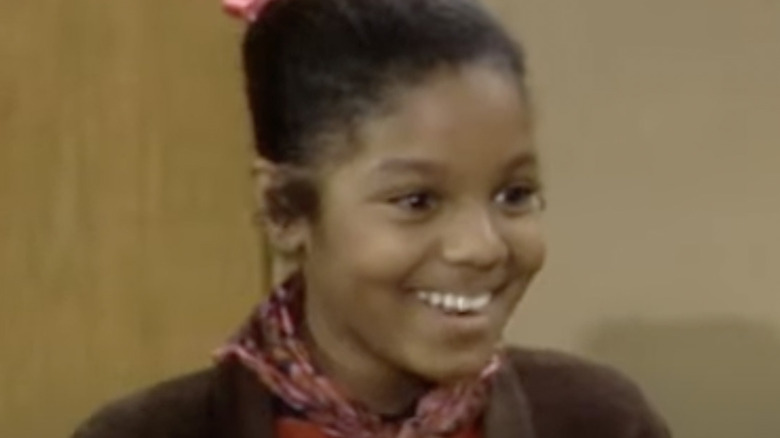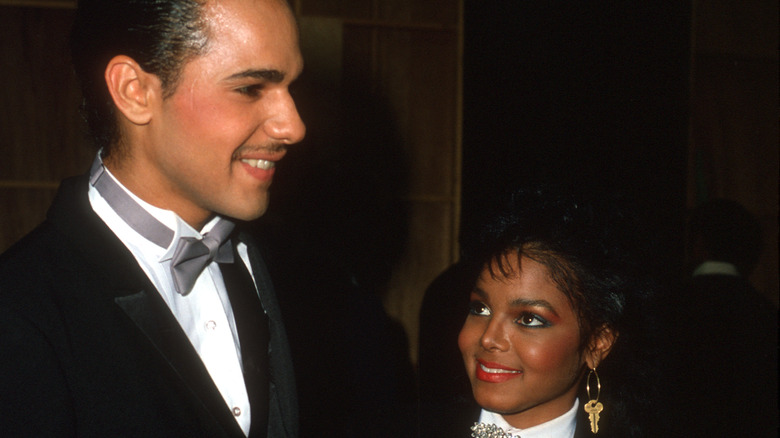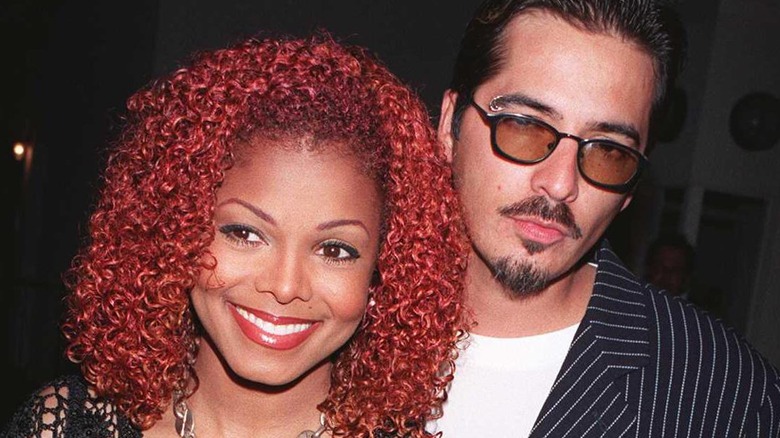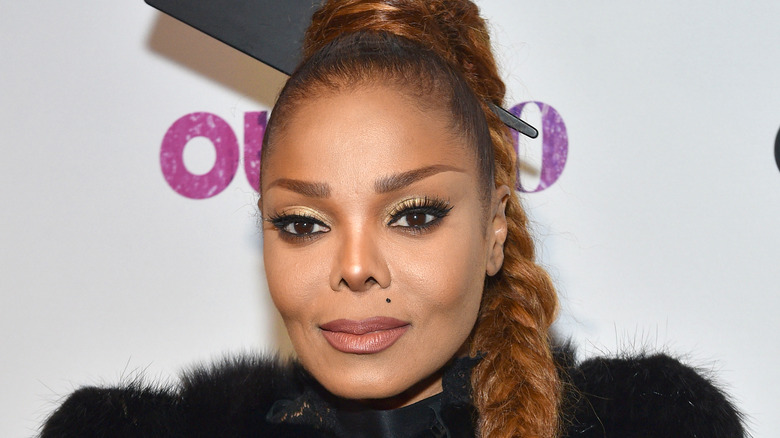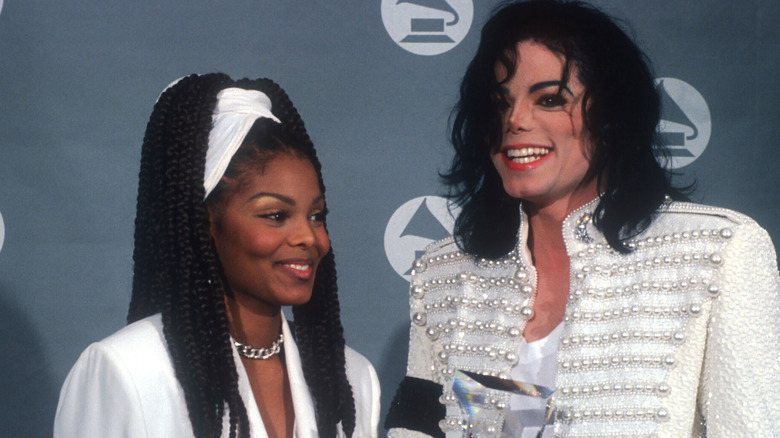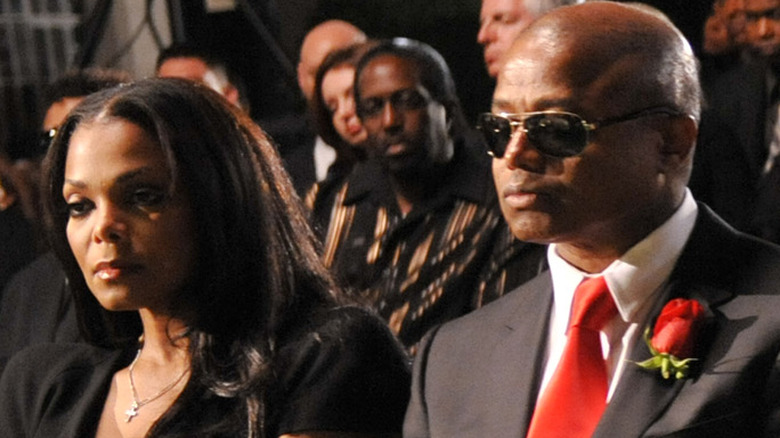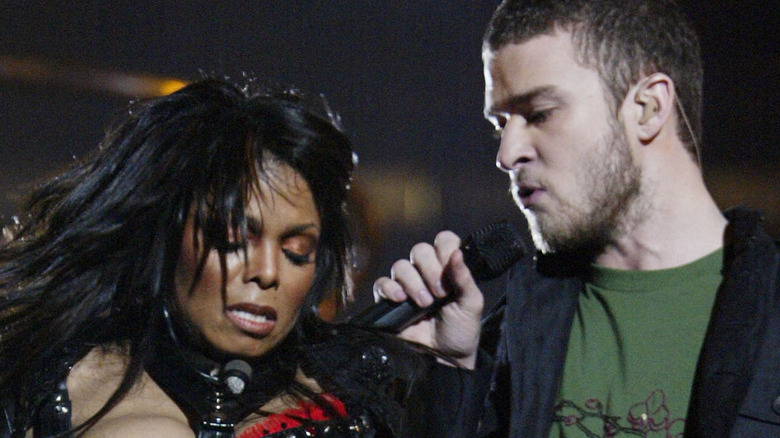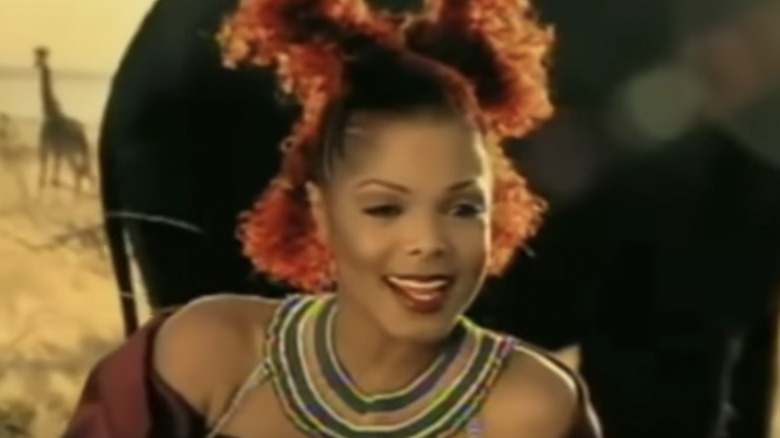The Tragic Real-Life Story Of Janet Jackson
Even independently from her famous family full of pop stars like Michael Jackson and the Jackson 5, Janet Jackson is a household name and one of the most successful musical artists of all time. Having sold 26 million albums (in the U.S. alone, per the RIAA) and topped the American singles chart 10 times, Jackson defined dance pop in the 1980s with classics like "Nasty," "What Have You Done for Me Lately," "The Pleasure Principle," and "Miss You Much," then set a standard for sultry, mature R&B in the '90s with "Love Will Never Do (Without You)," "That's the Way Love Goes," "Again," and "I Get Lonely."
Jackson was a superstar of the highest caliber who performed on the world's most prominent stages and earned an international reputation as a musical innovator. Seeming superhuman at times, Jackson was still the sensitive person that came across in her tender and intimate ballads. Jackson suffered greatly, enduring hardship, tragedy, and loss before, during, and following the period in which she ruled pop culture. Here's a look into the sadder parts of the life of Janet Jackson.
Janet Jackson's childhood was sometimes rough
In a 2011 interview on CNN's "Piers Morgan Live" to discuss her very personal self-help book "True You: A Journey to Finding and Loving Yourself," Janet Jackson discussed her childhood, a period fraught with abuse and fear. Jackson, the second-youngest of nine siblings, said that her other brothers and sisters thought their father, Joe Jackson, was relatively easy on her, but she still found him to be "very strict" and "tough," rarely told her he loved her, didn't like it when she cried, and insisted that she call him "Joseph" instead of "Dad."
And while Jackson confirmed that his father could be a physically punitive disciplinarian with her brothers, he only struck her once, when she was not yet 8 years old and climbing out of a bathtub. "And I can't remember what it was that I did," Jackson said. "I can't remember if I truly deserved it."
If you or someone you know may be the victim of child abuse, please contact the Childhelp National Child Abuse Hotline at 1-800-4-A-Child (1-800-422-4453) or contact their live chat services.
All three of Janet Jackson's marriages ended
Janet Jackson has been married three times, each with a wedding and relationship largely unknown to the world at large. According to People, in the summer of 1984, 18-year-old Jackson eloped with James DeBarge, of the popular R&B group DeBarge. Jackson's brothers and parents were alarmed, as was John McClain, an executive at her label, A&M Records. "I tried to convince her that she's a teen idol and people wouldn't accept it," McClain said. After eight months of persuasion, Jackson did as McClain suggested and annulled the marriage. More than 20 years later, DeBarge claimed on the TV series "Growing Up Hip Hop" (via ET Online) that his brief relationship with Jackson produced a secret daughter, a notion Jackson denied in a 2001 interview with Vibe.
In 2000, Jackson's second husband, Rene Elizondo, filed for divorce after nine years of marriage (per Rolling Stone), and 12 years later, the singer married Qatar-born billionaire businessman Wissam Al Mana, according to People. Not long after their son, Eissa, was born in January 2017, the couple split. "The cultural differences between her and Wissam became even more obvious," a source close to the couple said. "They come from different worlds." According to a Page Six report, Jackson thought Al Mana "had become too controlling during the pregnancy and she had already allowed him to dictate her appearance." He had even banned her from wearing revealing clothing or doing any provocative dance moves in music videos.
Janet Jackson's second ex-husband sued her for millions
After her short marriage to James DeBarge but before her ill-fated relationship with Wissam Al Mana, Janet Jackson was in a long-term romance with collaborator Rene Elizondo. According to Rolling Stone, it was public knowledge that the couple were an item throughout the 1990s, but few knew the couple had gotten married in March 1991 until Elizondo filed for divorce in June 2000, a year and a half after the couple's initial separation. Jackson and Elizondo had worked together in various ways since the mid-1980s. He earned co-writing credits on 37 of Jackson's songs, directed her videos for the singles "Again" and "That's the Way Love Goes," and had a small part in Jackson's movie "Poetic Justice."
Elizondo cited "irreconcilable differences" as grounds for the divorce, but in December 2000 (via MTV News), the songwriter and director sued his estranged wife for millions, claiming that Jackson failed to make good on an agreement to split property obtained while they were a couple but before they got married. In the filing, Elizondo reported that Jackson had said she'd split profits from her 1989 album "Rhythm Nation 1814," among other properties. Media reports vary on how much Elizondo sued for (anywhere from $10 million to $25 million, per ABC News), but when the legal dust settled two years later, Jackson had to pay out $15 million and cede the deeds to a Mercedes and a five-bedroom Malibu beach house.
Janet Jackson suffered from depression
For a roughly two-year period from 1995 to 1997, Janet Jackson dealt with a long-lasting depressive episode. It coincided with a period in which she didn't speak with her sister, LaToya Jackson, and was so distant from her brother, Michael Jackson, that she had not yet met his baby son.
"I was very, very sad. Very down. Couldn't get up sometimes. There were times when I felt very hopeless and helpless, and I felt like walls were kind of closing in on me," Jackson told Newsweek. "I didn't know what it was and it would come, like, here and there. I thought I was just having a funky day. And it just got progressively worse until it was every day." Jackson recalled that while recording "The Velvet Rope," she would cry so hard she would be unable to sing, delaying the production of the album "because it was too overwhelming at times."
Jackson traced her depression to elementary school. "Not all my Caucasian teachers were mean, but I had a couple that weren't nice to be at all. One of them embarrassed me in front of the entire class and I just never got over that."
If you or someone you know is struggling with mental health, please contact the Crisis Text Line by texting HOME to 741741, call the National Alliance on Mental Illness helpline at 1-800-950-NAMI (6264), or visit the National Institute of Mental Health website.
Janet Jackson suffered from eating disorders
At the age of 10, according to Marie Claire, Janet Jackson's father got her a role as Penny Woods on the later seasons of the hit '70s sitcom "Good Times." As she grew into adolescence in front of TV cameras, Jackson subsequently suffered psychological blowback. "They would put gauze around my chest to make me smaller, and I think that has an effect on you," Jackson said. "As if who you are isn't good enough."
As an adult, Jackson's body image issues manifested as an eating disorder. "Food has always brought me comfort and the binging is triggered when I'm in a space that is not positive," she told The Telegraph. "Maybe something happened and I'm feeling depressed, I eat to fill that void. Afterwards I'll beat myself up about it." Additionally, according to the New York Daily News, Jackson adopted patterns of bulimia and anorexia. "I had swung so far in one direction ... I never thought I could swing so far in the other," Jackson said. "You're losing weight and getting smaller, and I'd still say to myself I could afford to lose a little more." She said that people around her had been able to tell when something was wrong, and she's learned to keep an open mind to those words.
If you are struggling with an eating disorder, or know someone who is, help is available. Visit the National Eating Disorders Association website or contact NEDA's Live Helpline at 1-800-931-2237. You can also receive 24/7 Crisis Support via text (send NEDA to 741-741).
Janet Jackson defended her brother, Michael Jackson
Both during his lifetime and after, pop star Michael Jackson was accused of child abuse of a serious and sensitive nature. According to NPR, the Los Angeles Police Department opened an investigation in August 1993 into claims that Jackson assaulted four children, and the musician was subsequently sued by the family of one of his purported victims. Jackson evaded criminal charges for that matter, but in 2003 he was arrested and went to trial for molestation, but was ultimately acquitted. In 2013 and 2014, two men sued Jackson's estate, alleging he assaulted them repeatedly, a story explored in the 2019 HBO documentary "Leaving Neverland."
Michael Jackson's sister, Janet Jackson, was left having to publicly defend her brother against such unspeakable crimes. In the 2016 documentary "Unmasked" (via Newsweek), Jackson labeled the 1993 case — in which the family of the accuser accepted a large cash settlement — as baseless. "If this really went on, do you think a father would accept money?" Janet Jackson rhetorically questioned. "The guy was after money — that is all he wanted." Upon the release of "Leaving Neverland" in 2019, other members of the Jackson family categorically denied all allegations, while Janet Jackson remained silent. "I think there is a fear as well to put more energy to it and more eyeballs to it," nephew Taj Jackson told CBS This Morning. "That's why my aunt Janet hasn't said anything, because she doesn't want to make it any bigger."
It's pretty understandable. After all, per Newsweek, in the wake of these allegations, Jackson has felt the pressure of being a part of such a famous family, and she's said that the media response has painted her as "guilty by association."
Janet Jackson was devastated by the death of her brother
In June 2009, amidst rehearsals for a sold-out series of London concerts designed to revive his career, according to The Guardian, music superstar and "King of Pop" Michael Jackson unexpectedly died at the age of 50. After being discovered unresponsive at his Los Angeles home, emergency revival techniques failed and Jackson was pronounced dead at a local hospital. Per Newsweek, Jackson died from an overdose of the powerful, surgical painkiller propofol, for which his personal physician, Dr. Conrad Murray, was found criminally responsible.
Jackson was close with his sister, fellow music superstar Janet Jackson, the latter of whom spoke about the death about a year later on "The Oprah Winfrey Show" (via CNN). "People think we were in denial but we weren't. We tried intervention several times," the singer said of efforts to address her brother's substance abuse issues. "He was very much in denial — he didn't think he had a problem." Jackson added that the death of her brother was "hard to believe still" and that there "[wasn't] a day that goes by" where she nor anyone else in the family "[doesn't] think about it."
If you or anyone you know is struggling with addiction issues, help is available. Visit the Substance Abuse and Mental Health Services Administration website or contact SAMHSA's National Helpline at 1-800-662-HELP (4357).
Janet Jackson suffered greatly for her wardrobe malfunction at the Super Bowl
Janet Jackson and Justin Timberlake performed at the 2004 Super Bowl, per Esquire, and at the conclusion of the show, Timberlake tore off a piece of Jackson's costume as choreographed, but he pulled too hard, resulting in the exposure of Jackson's breast. The 2004 Super Bowl, and the "wardrobe malfunction," aired on CBS, a network run at the time by Les Moonves. In 2018, per NPR, Moonves lost his spot at the top of the network following allegations of sexual misconduct toward 12 women, and in the midst of the investigation of that scandal, according to HuffPost, news of Moonves' behavior toward Jackson surfaced.
After receiving a $550,000 fine from the FCC, Moonves reportedly prevented Jackson and Timberlake from appearing on the 2004 Grammy Awards broadcast on CBS, but restored Timberlake after the singer profusely apologized. Moonves deemed an apology from Jackson insufficient, and apparently attempted to lay waste to her career. He ordered sibling companies VH1 and MTV, as well as any CBS or Viacom-related radio stations, to cease playing Jackson's videos and music (per Rolling Stone), which basically meant non-promotion of Jackson's latest album, "Damita Jo," which sold poorly relative to her previous releases. In 2011, nearly a decade after the Super Bowl, Moonves reportedly got angry when he found out CBS-owned Simon & Schuster signed Jackson to publish "True You: A Journey to Finding Love and Yourself."
Together Again is about the loved ones she lost to AIDS
As one of the most dominant pop stars of the 1990s, Janet Jackson went to No. 1 on the Billboard Hot 100 five times during the decade, the final chart-topper being "Together Again," the second single from her 1997 album "The Velvet Rope." A bouncy, peppy, danceable song, the music of "Together Again" obscures the hit's lyrical message and intent. "I wanted to write about friends who have died of AIDS without being mournful or sad," Jackson told MTV News. "I wanted to celebrate their spirit." In the liner notes to "The Velvet Rope" (via the album's "33 1/3" book), Jackson specifically dedicated "Together Again" to "the friends I've lost to AIDS, Dominic, George, Derek, Bobby, Dominic, Victor ... José. I miss you and we will be together again. This was written for you."
According to the UN AIDS Outlook report, the song, released in commemoration of World AIDS Day 1997, sold 6 million copies worldwide and raised awareness of the fight against the deadly disease. Jackson pledged proceeds from the single to AmFAR, the American Foundation for AIDS Research.

